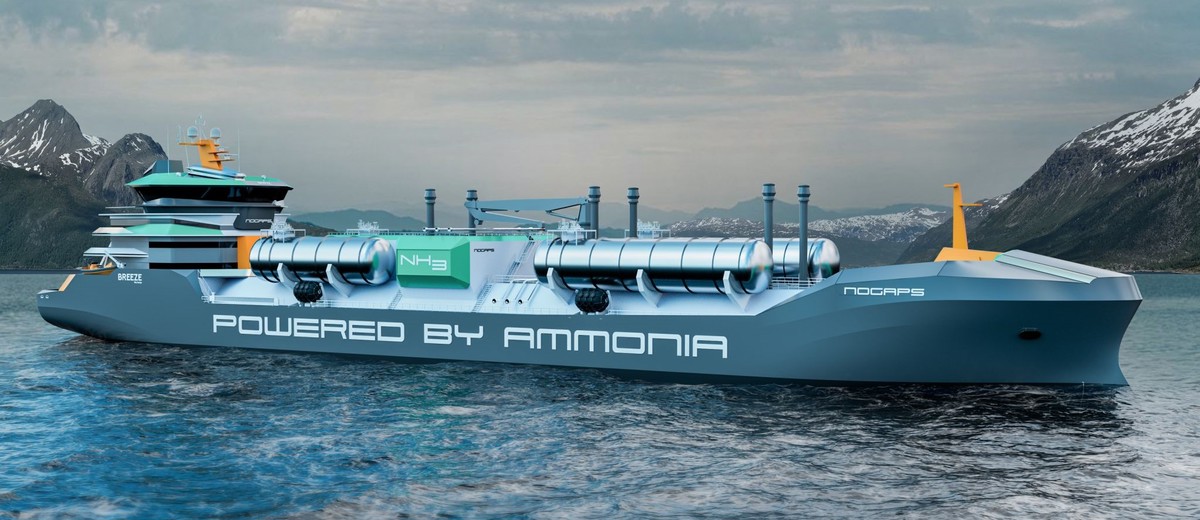The Week in Alt Fuels: Interplay of caution & demand
Suppliers fear there will not be enough e-fuel demand from shipping, T&E reported. However, a recent increase in orders for ammonia- and methanol-fuelled vessels reflects the confidence shown by shipping firms in these fuels.
 PHOTO: Initial ship design of an ammonia-fuelled gas carrier. LinkedIn of MMMCZCS
PHOTO: Initial ship design of an ammonia-fuelled gas carrier. LinkedIn of MMMCZCS
According to a Transport & Environment (T&E) study, fuel suppliers are cautious about investing in new e-fuel projects, citing uncertainties regarding future shipping demand. The study covered 61 synthetic fuel or e-fuel projects throughout the EU. Around 66% of these projects are “at risk” of scaling down the planned capacity or being delayed beyond their committed timelines and may not be operational in this decade, it warned.
However, recent order book data suggests that there is growing interest in including methanol and ammonia in the future bunker fuel mix. Classification society DNV's latest tally shows 304 confirmed methanol-capable vessels in operation and on order for delivery towards 2028, up from 281 in April. In addition, there are 22 confirmed ammonia-capable vessels on order for delivery by 2027.
Finnish engine maker Wärtsilä, Italian gas firm Gas and Heat and classification society RINA will develop a dual-fuel ammonia bunkering vessel. The vessel will be equipped with a four-stroke ammonia engine from Wärtsilä. It will be able to run on ammonia along with conventional marine fuels, classification society RINA said.
Three vessel concepts, a feeder and two ammonia carriers, featuring Amogy's ammonia-to-power technology, received approvals from multiple classification societies. HD Hyundai Heavy Industries’ 93,000-cbm ammonia carrier design has received approval in principle from the American Bureau of Shipping and Liberian Registry. Samsung Heavy Industries’ 88,000-cbm ammonia carrier design has received approval in principle from Lloyd’s Register (LR).
The feeder vessel concept designed by South Korea’s Hyundai Mipo and HD Korea Shipbuilding & Offshore Engineering (KSOE) has also received an LR nod.
ABS and LR also granted another approval in principle for a 3,500 TEU-capacity ammonia-capable container ship design. The design has been jointly developed by A. P. Møller-Mærsk, MAN Energy Solutions (MAN ES), Deltamarin and others. The project is led by the Mærsk Mc-Kinney Møller Center for Zero Carbon Shipping. The ship will be equipped with a MAN ES ammonia engine and a 4,000-cbm capacity ammonia tank.
In other news, Greek marine tech firm ERMA FIRST will supply carbon capture and storage (CCS) systems for four liquefied carbon dioxide (LCO2) carriers. Its onboard CCS system uses an amine solvent to absorb CO2 from flue gases. The mixture then undergoes heating, which triggers a chemical reaction that separates the CO2 from the solvent. This separated CO2 is then converted into a liquid form using a specialised system developed by the UK-based company Babcock.
UK-based tanker operator Union Maritime will install rigid sails on 34 of its newbuild vessels. Rigid sail, also known as solid sail or wing sail, is a type of sail technology used on ships to harness wind energy for propulsion. In this project, rigid sails will be provided by UK-based marine engineering firm BAR Technologies. Wind-assisted propulsion systems have been gaining popularity among shipowners as they help to improve vessels' fuel efficiency.
By Konica Bhatt
Please get in touch with comments or additional info to news@engine.online






